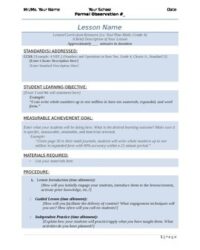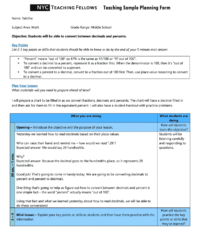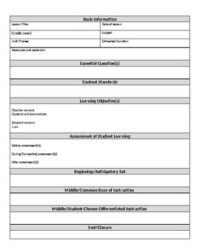Stepping into a classroom, especially when you know an observation is scheduled, can bring a mix of excitement and nerves. It’s a chance to showcase your hard work, your passion for teaching, and the wonderful dynamics of your classroom. Yet, even the most seasoned educators appreciate a clear roadmap for these moments. A well-crafted lesson plan isn’t just a requirement; it’s your story told on paper, detailing every thoughtful step you’ve prepared for your students.
In the whirlwind of daily teaching, preparing for an observation can feel like an added chore. However, approaching it with a structured plan can transform it into a valuable opportunity for reflection and growth. This is where a teacher observation lesson plan template truly shines, offering a framework that guides your preparation, ensures you hit all the necessary points, and ultimately, helps you present your best teaching self during that critical observation moment.
The Core Elements of an Effective Observation Lesson Plan
When an observer enters your classroom, they are looking to understand your pedagogical choices, your classroom management, and most importantly, how your students are learning. Your lesson plan acts as the blueprint for this understanding. It allows the observer to follow along with your objectives, anticipate student responses, and see how you respond to the dynamic needs of the classroom. It’s not merely a checklist but a narrative that explains your ‘why’ behind every ‘what’.
A robust lesson plan for observation goes beyond a simple outline of activities. It clearly articulates the learning objectives, outlining what students will know and be able to do by the end of the lesson. It details the materials and resources required, ensuring a smooth flow of instruction. Furthermore, it meticulously outlines the procedures, from the attention-grabbing hook to the reflective closure, indicating the estimated time for each segment and the specific instructional strategies you intend to employ.
Crucially, an effective observation lesson plan also highlights how you cater to the diverse needs of your learners. This includes differentiating instruction for various learning styles and abilities, providing support for struggling students, and challenges for advanced learners. It also details your assessment strategies, showing how you will check for understanding throughout the lesson and measure learning outcomes. This holistic view provides the observer with a comprehensive understanding of your teaching philosophy and practice.
Finally, a truly insightful lesson plan includes a section for reflection or next steps. While this might be added after the lesson, considering it beforehand helps you plan for potential challenges or opportunities for extension. It demonstrates a forward-thinking approach to teaching, showcasing your commitment to continuous improvement and responsiveness to student progress. This foresight is highly valued in any observation scenario.
Key Components to Include
- Clear, Measurable Learning Objectives: What students will achieve.
- Materials and Resources: Everything needed for the lesson.
- Detailed Procedures: Step-by-step instructions for activities, transitions, and teacher actions.
- Differentiated Instruction: How you support and challenge all learners.
- Formative and Summative Assessments: Methods for checking understanding.
Demonstrating Effective Pedagogy
- Anticipated Student Responses: How students might react and your planned interventions.
- Questioning Strategies: Types of questions to promote higher-order thinking.
- Classroom Management Techniques: How you maintain a positive learning environment.
- Time Management: Realistic pacing for each segment of the lesson.
Leveraging a Teacher Observation Lesson Plan Template for Success
The beauty of a teacher observation lesson plan template lies in its ability to streamline your preparation process. Instead of starting from scratch each time, a template provides a consistent structure, prompting you to consider all the essential elements that observers look for. This not only saves valuable time but also ensures that no crucial detail is overlooked, helping you feel more confident and prepared when the observation day arrives.
For the teacher, using a template fosters a disciplined approach to lesson design. It encourages thoughtful planning, leading to more coherent and purposeful lessons. For the observer, a consistent template makes their job easier. It provides a familiar format, allowing them to quickly identify key information, track the lesson’s progression against your plan, and offer more targeted and constructive feedback. It creates a shared understanding of the lesson’s intent and execution, leading to a more productive observation cycle.
While templates offer structure, the most effective ones are also adaptable. They provide the skeleton, but you, as the educator, bring the flesh and blood of your unique teaching style and the specific needs of your students. Customizing a template allows you to infuse your personality and pedagogical expertise, ensuring the plan truly reflects what will happen in your classroom. It’s about leveraging a tool to enhance your planning, not to stifle your creativity.
- Saves Time and Reduces Stress: No need to reinvent the wheel for each observation.
- Ensures Comprehensive Planning: Prompts you to cover all critical areas.
- Facilitates Clear Communication: Helps observers understand your lesson’s design and intent.
- Promotes Consistency: Develops a reliable format for all your observation plans.
- Supports Self-Reflection: Encourages you to think deeply about your teaching strategies.
Ultimately, the effort invested in creating a detailed and thoughtful lesson plan for an observation extends far beyond that single event. It refines your instructional design skills, encourages you to think critically about student engagement and assessment, and strengthens your overall teaching practice. Each observation, supported by a clear plan, becomes a stepping stone in your professional journey.
By embracing structured planning, educators empower themselves to not only meet but exceed expectations during observations. This commitment to meticulous preparation fosters a deeper understanding of one’s own teaching strengths and areas for growth, leading to more impactful lessons and, most importantly, enhanced learning experiences for every student in the classroom.


